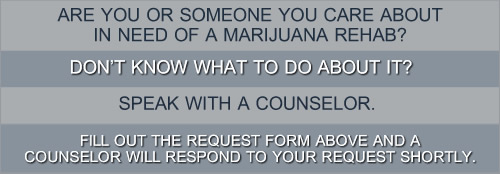
Marijuana Rehabs
Long-term use of marijuana is known to cause addiction. The statistics on marijuana addiction and use are startling: an estimated 9% of marijuana users become dependent on it. If one has started using marijuana when young, chances are that every 1 in 6 persons can become dependent. As much as 30% of the daily users fall prey to psychological and physical marijuana dependence. It is estimated that more than 5 million Americans use marijuana on a daily basis. Though marijuana is considered less harmful than substances such as meth and crack, those who are addicted to harder drugs invariably started the drug journey with marijuana.
Addiction to marijuana has a withdrawal symptom that is very close to nicotine withdrawal, with the result that it is difficult to quit the addiction. As it takes a longer time to overcome the marijuana dependence, addicts frequently feel depressed and despondent. There are many marijuana users who warrant a treatment at the marijuana addiction rehab center. They benefit from professional treatment programs at these centers.
Marijuana is mostly smoked, sometimes mixed with beverages and consumed, and in very rare conditions injected. Users experience intoxication and are in a hallucinatory state in which sensations are magnified. Sexual arousal is also intensified. Most marijuana addicts display signs of clouded memories and other mental defects. Respiratory tract infections coupled with bronchitis is also common among addicts.
Though most marijuana users claim that on using marijuana one cannot get addicted to it, the plain fact is, however, marijuana is addictive. According to the American Psychology Association, any individual who answers in the affirmative for at least three of the following characteristics is classified as an addict by the medical fraternity:Do you use a greater amount of marijuana to get the same high than when you first started using the drug?Do you have any withdrawal symptoms when you stop taking marijuana? Do you have any other drug instead to alleviate the withdrawal symptoms?Do you tend to smoke more marijuana than you intended to in a session?Do you feel like cutting down on your marijuana use but are unable to do so?Does your marijuana habit take more time in terms of smoking, recovery, trying to make the money for the regular score, etc?Have you reduced your active involvement in any work/hobby/recreational activity that used to be more important before you started smoking marijuana?Do you smoke marijuana in spite of knowing that it is harmful?
Substance Abuse and Mental Health Administration (SAMHSA) reports that those addicts who want to quit and enroll in a rehab program are more successful in giving up the marijuana drug habit than those who are motivated to quit but do not enroll in a marijuana rehab. An intensive rehabilitation program is also seen to bring about better long-term results for the marijuana users.
There are no medications that would directly treat marijuana abuse/addiction. However, psychosocial treatment programs work more effectively in marijuana rehabs. Cognitive behavior therapy, support group therapy, contingency intervention programs, and community reinforcement programs are some psychosocial therapy programs offered by the marijuana rehabs. These programs are most often conducted as outpatient procedures. However, in certain cases, when the addiction is accompanied with a co-occurring mental instability/disorder or when the treatment is complicated because of poly-drug addiction, then the recovery procedures are inpatient.
Outpatient marijuana rehab procedures have some benefits that an inpatient program may not provide. They are:The addict continues to work and support the family.The recovering addict can choose convenient timings for the counseling sessions (day/night).Incentive programs for continued abstinence from marijuana use.Development of confidence from being able to resist the temptation of using marijuana.
Marijuana rehabs also conduct random or regular testing for presence of the drug. The continuance of the program may be dependent on how clean the outcomes of the tests are.
Cognitive Behavioral Therapy Program for Marijuana Addiction
This method of treatment has been proved to be very effective for marijuana addiction. The approach of the cognitive behavioral program is two-pronged: (1) it teaches the recovering addict to think about their lives in a constructive way and (2) provide coping skills and alternatives to avoid continued use of the drug.
This type of treatment was initially started for the alcoholics, modified for cocaine addicts and now has been found effective for marijuana users as well. The method of treatment is based on the fact that an individual's thoughts and perceptions can go a long way in controlling his/her behavior. The therapy is aimed at making the individual better prepared to resist the temptation of using marijuana and making a healthier choice.
Motivational Enhancement Therapy for Marijuana Addiction
Many marijuana abusers believe that they do not have an addiction problem. Marijuana rehabs employ motivational enhancement therapy for such individuals. The program consists of a number of questions that the addict has to answer. This is followed by numerous counseling sessions where they obtain the results of the questions posed to them. In subsequent sessions, the recovering marijuana addicts are motivated to find their own reasons to successfully complete the treatment procedure. This program works more effectively when the drug addict is reluctant to go through a set recovery program.
However, for any marijuana rehabilitation treatment program to be successful, the following points are to be kept in mind:No preset treatment method works for everyone. Programs have to be tailored to suit individual needs.Therapies should focus on the emotional, physical, and mental needs of the patient.The recovering marijuana addict should be monitored regularly.Remaining in the recovery program for a substantial period of time is very crucial. Discontinuance can lead to a relapse.Addiction is treatable.The addict must find it easy to access the therapies.
Marijuana rehabs provide the safest environments for recovering addicts to get rid of uncomfortable emotions and learn to make healthier choices. They are also equipped to treat the co-occurring medical disorders that may accompany regular use of the drug. Targeted treatment offered by marijuana rehabs provides a number of tools to help the recovering addict to overcome relapse and addiction.
Marijuana rehabs provide the safest environments for recovering addicts to get rid of uncomfortable emotions and learn to make healthier choices. They are also equipped to treat the co-occurring medical disorders that may accompany regular use of the drug. Targeted treatment offered by marijuana rehabs provides a number of tools to help the recovering addict to overcome relapse and addiction.
- Questions?
